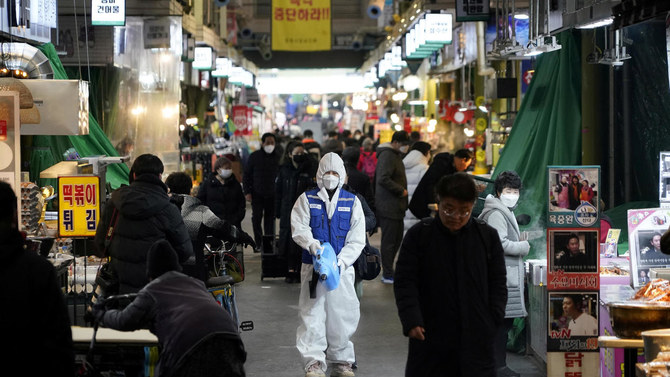SEOUL: South Korea on Wednesday earmarked $9.8 billion to fight the coronavirus outbreak as the number of infections soared to 5,621, badly hitting the country’s economy.
Authorities reported 293 new cases on Wednesday alone, with the death toll from the virus hitting 34.
Nearly 90 percent of the COVID-19 infections were diagnosed in the southeastern city of Daegu and nearby towns.
And the number of confirmed cases in the east Asian nation was expected to rise even more with the country’s Ministry of Health and Welfare awaiting the test results of 28,000 people.
“Daegu is in a very difficult situation,” said South Korean Prime Minister Chung Sye-kyun, who has set up an ad hoc office in the city. “We can win this war against COVID-19 when we all fight together.”
More than 4,000 people have tested positive in Daegu alone, and some 770 in nearby North Gyeongsang province. Most of the cases in Daegu are linked to the Shincheonji Church of Jesus religious group.
On Tuesday, South Korean President Moon Jae-in vowed an all-out campaign against the outbreak, ordering all government agencies to be on 24-hour emergency alert.
“The crisis in Daegu and North Gyeongsang province reached its peak and the whole country has entered a war against the infectious disease,” Moon said, apologizing for a shortage of face masks, as public anger against his administration grew over its handling of the outbreak.
With South Koreans queuing outside retail stores and pharmacies to buy masks, and hospitals struggling to find beds for patients, an online petition for the impeachment of the humanitarian lawyer-turned-president had on Wednesday attracted nearly 1.5 million signatures.
Petitioners have also criticized the government’s failure to impose a complete ban on visitors from China, where the coronavirus originated.
The government’s $9.8 billion supplementary budget plan is aimed at mitigating the impact of the largest outbreak of the virus outside China, as efforts to contain the disease worsen supply disruptions. The country’s largest-ever supplementary budget in response to a contagious disease is now subject to approval by the National Assembly.
The South Korean military has deployed thousands of doctors and medical staff to assist at civilian hospitals. In a bid to find and isolate infected people, 48 drive-through testing centers have been set up by the government, where people can be examined without getting out of their cars to limit the chances of infection.
More than 90 countries and territories have now imposed entry restrictions or stricter quarantine procedures on travelers from South Korea over coronavirus concerns.
Among them, Qatar began to enforce an entry ban from Monday on foreigners with a record of visits to South Korea, China, Iran, Italy or Egypt over the past month.
Five other countries — the Maldives, Vietnam, Japan, Fiji and the Philippines — were barring entry to anyone who had been to Daegu or its nearby towns.
Several other countries and some Chinese provinces were imposing a mandatory 14-day quarantine for travelers from South Korea.
“I spoke to a number of foreign counterparts and they told me the measures were taken because they had lax quarantine systems and these really have nothing to do with the relations with South Korea,” Foreign Minister Kang Kyung-wha told a parliamentary session.
Kang said she had spoken on the phone with her counterparts from India, Iraq, Indonesia and El Salvador to call for the easing of their travel restrictions on South Koreans.
The US has yet to implement entry restrictions, but American President Donald Trump said on Tuesday that Washington was looking closely at South Korea over the coronavirus outbreak and would decide whether to impose travel restrictions on its Asian ally “at the right time.”
Meanwhile, the South Korean foreign ministry is to send three rapid response teams to Vietnam this week to help some 270 Korean nationals who have been quarantined there.















